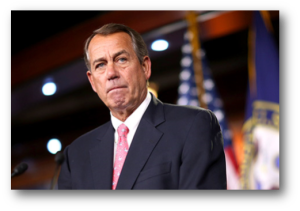On Friday, September 25th, John Boehner (R-Ohio), Speaker of the House, announced his resignation from Congress. Conservatives were pressuring Boehner, a Republican, to take a harder line on their causes, most recently defunding Planned Parenthood as part of a package that would keep the government open. By resigning, Boehner has decreased the chances of yet another government shutdown. Boehner made it clear that the House will vote next week on a clean spending bill to keep the government open through mid-December while broader negotiations on spending levels are held and then move on budget reconciliation legislation where both repealing the Affordable Care Act and stripping Planned Parenthood of funding will be considered.
Boehner’s main reason for resignation was this increasing pressure placed on him since the beginning of his time as House Speaker in 2010. Boehner has been pressured throughout his tenure to push for deeper spending cuts and more aggressive policy changes than were possible with President Obama in the White House. He seemed to decide that resigning, and leaving an exhausting position, was better than facing a humiliating fight within his own party. Additionally, he cites his meeting with Pope Francis, just the day before, as an event that spurred him on and gave him the confidence to leave. Many people were sad to see him go – although nearly none of them were Republicans.
Nancy Pelosi (D-Cal.), the Democratic leader in the House, called Boehner’s resignation “seismic for the House” and called it evidence of the far right’s “hijacking” of the Republican Party. “God knows what’s next over there,” she told staff members. Ms. Pelosi, who had been privately negotiating on a plan to keep the government open, told reporters that Mr. Boehner’s resignation was “a stark indication of the disarray of House Republicans.” She says she continues to negotiate directly with Boehner to achieve her goal of funding Planned Parenthood. President Barack Obama also commented on Boehner’s resignation, remarking that Boehner was a good man and a patriot, and that while their views differed Boehner had “always conducted himself with civility and courtesy with me.” Many other Democrats mourn Boehner’s decision, as he will most likely be replaced with a far more conservative member of the Republican party.
Some Republicans did support Boehner, like House Ways and Means Chairman Paul Ryan (R-Wis.), his party’s 2012 vice presidential nominee, said Friday he didn’t want Boehner’s job. “This was an act of pure selflessness. John’s decades of service have helped move our country forward, and I deeply value his friendship,” Ryan said in a statement. Rep. Richard Nugent (R-Fla.) also applauded Boehner’s selflessness, saying “Obviously the pope had a big impact on him. That’s about the most selfless act I’ve sever seen, willing to step down to save this country and save this nation.” Others felt otherwise, like Senator Marco Rubio (R-Fla.), who implied that Boehner’s resignation was a chance for new, more powerful leadership. Senator Ted Cruz (R-Tex.) also criticized Boehner’s tenure, without mentioning him, by saying that “I have long called on Republican leadership to do something unusual, which is lead. Go actually stand up and honor the commitments that we made to the American people.”
It looks as if anyone could replace Boehner, although it seems that Rep. Kevin McCarthy (R-Cal.) is a frontrunner. He is much more receptive to the Tea Party members of the GOP compared to Boehner. Rep. John Boehner will officially leave his position as Speaker of the House at the end of October. We can only hope that his replacement will be as rational as he was.


